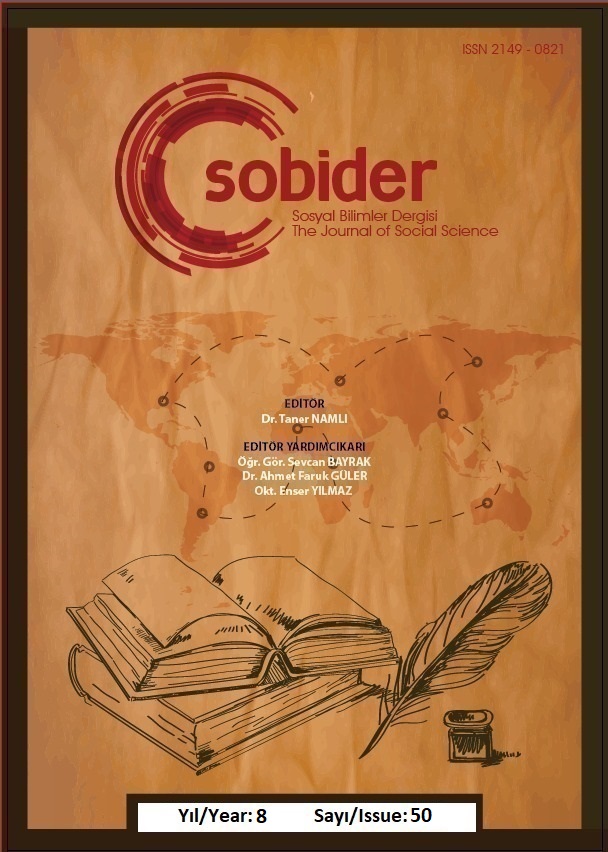Author :
Abstract
Siyasal, hukuksal ve ahlaki sistemlere dair olan yasalar kendilerini bir gereklilik olarak sunarlar. Bu gereklilik aynı zamanda evrensel ve zorunlu olma ihtiyacını da beraberinde getirir. Modernizm nazarında yasaların evrensel ve zorunluluk koşulu nesnel bir temele dayanmaları ile mümkündür. Günümüz siyasal, hukuksal ve ahlaki sistemlerine dair olan yasaların kavramsal kökenlerinin izini modernizmde görmek mümkündür. Modernizm geleneksel olandan kopuş süreci olarak tanımlanabilir. Bu sürecin tipik özelliği dünya dışı hakikat arayışından dünyaya dair olan somut bir zemine yöneliştir. Bu somut zemin, birlikte yaşamın olanaklı koşulu olarak görülür. 17. ve 18. Yüzyıl boyunca siyaset, hukuk, bilim alanında meydana gelen gelişmeler bu konuda büyük bir arayışın olduğunu göstermektedir. Bu çalışma söz konusu dönemde yasa kavramının geçirmiş olduğu dönüşümü genel hatlarıyla ele almayı amaçlamaktadır. Bu doğrultuda Hobbes, Rousseau ve Kant’ın görüşlerine yer verilecektir.
Keywords
Abstract
The law of political, moral and legal systems are related to an ought. This ought should also become universal and compulsory. In the view of modernism, the universal and necessary condition of laws is only possible if they are based on an objective basis. It is possible to trace the conceptual roots of laws of political, legal, and moral systems in the modern age. Modernism can be defined as the process of disengagement from the traditional. The character of this process is the effort to find a concrete ground. This concrete ground is seen as the possible condition of coexistence. Developments in politics, law and science during the 17th and 18th centuries showed that there was a great search about this issue. This study aims to deal with the transformation of the concept of law in this period in general terms. In this direction, views of Hobbes, Rousseau and Kant will be included.
Keywords
- Dreier, H (2004), “Kants Republik”, Juristen Zeitung, Vol. 15/16, 2004, Tübingen.
- Dreier, H (2004), “Kants Republik”, Juristen Zeitung, Vol. 15/16, 2004, Tübingen.
- Hobbes, T (2007), “De cive Yurttaşlık Felsefesinin Temelleri”, Belge Yayınları, İstanbul. Hobbes, T (2010), “Leviathan”, Yapı Kredi yayınları, İstanbul.
- Kant, I (1999), “Pratik Aklın Eleştirisi”, Türkiye Felsefe Kurumu, 3. Baskı.
- Kant, I (2009), “Ahlak Metafiziğinin Temellendirilmesi”, Türkiye Felsefe Kurumu.
- Kant, I (2013), “Grundlegung zur Metaphysik der Sitten”, Suhrkamp Verlag, Berlin.
- Kemper, U. (2015). “Politische Legitimität und politischer Raum im Wandel: Eine historisch- systematische Studie zu einem Kontextverhältnis”, Springer-Verlag.
- Özlem, D. (2004), “Etik-Ahlak Felsefesi”, İnkılap Kitabevi, İstanbul.
- Rousseau, J.J (2010), “Toplum Sözleşmesi”, İş Bankası Yayınları, İstanbul.
- Rousseau, J.J (2001), “Der Gesellschaftsvertarg oder Grundlagen des Staatsrechts Çev. Fritz Roepke, Leipzig.[ http://www.welcker-online.de/Texte/Rousseau/Contract.pdf]
- Doğan Özlem, “Etik-Ahlak Felsefesi”, İnkılap Kitabevi, İstanbul, 2004, s. 77
- Sina, A. (2016), “Eski Yunan Sistemi: MÖ. IV. Yüzyılda Atina’da Yargıçlar ve Mahkemeler”, TBB Dergisi, 2016(123), S. 419-50
- dwds.de, “Das Wortauskunftssystem zur deutschen Sprache in Geschichte und Gegenwart”, Erişim tarihi: 14.11.2020.
- etymoonline.com, Erişim Tarihi: 15.11.2020





